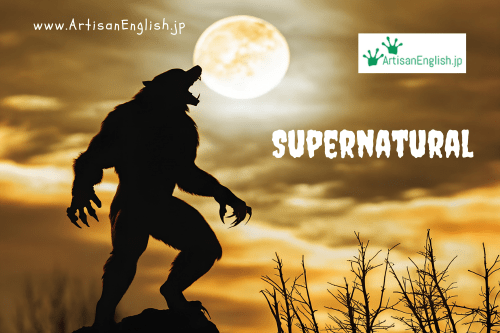
YouTube / iTunes / Spotify / Radio Public / Pocket Casts / Google Podcasts / Breaker / Overcast
Listen to ArtisanEnglish.jp posts & lesson intros here.
WotD: Supernatural
Halloween is the perfect time to bring up the word supernatural.
Saying something is supernatural means it cannot be explained by science or the laws of nature.
It comes from two parts: “super,” meaning above, and “natural,” which means nature.
So, supernatural means something that is above or beyond what is normal in the natural world.
Ghosts, witches, vampires, and werewolves are all examples of supernatural creatures.
On Halloween, many people enjoy dressing up as supernatural beings.
Costumes like ghosts, zombies, and demons are popular because they remind us of supernatural tales.
Some people even claim to have witnessed supernatural events, such as objects moving by themselves or hearing mysterious voices in old houses.
Supernatural themes run through Halloween decorations, too.
In North America, you will see supernatural symbols, such as black cats, haunted houses, or magical witches’ brews, in windows and yards in the weeks leading up to Halloween.
Even movies and TV shows about the supernatural are popular during this spooky season.
Supernatural is also the name of a famous TV series that follows two brothers, Sam and Dean, who hunt ghosts and other supernatural creatures.
In everyday conversation, you can use supernatural to describe anything that seems uncanny.
For example, if you hear a strange noise in the night, you might joke that it’s supernatural.
Remember, the supernatural is all about things we cannot easily explain.
So, this Halloween, enjoy the supernatural fun!
Whether you are telling supernatural stories, watching supernatural movies, or dressing up as a supernatural character, you are part of a long tradition of supernatural excitement.
Flesch-Kincaid Readability Test
This post compares in readability to The New York Times.
It is likely to be understood by a reader who has at least a 10th-grade education (age 16).
On the Flesch-Kincaid reading-ease test, this post scores 47.
The easier a passage is to read, the higher the score on a scale of 0 – 100.

